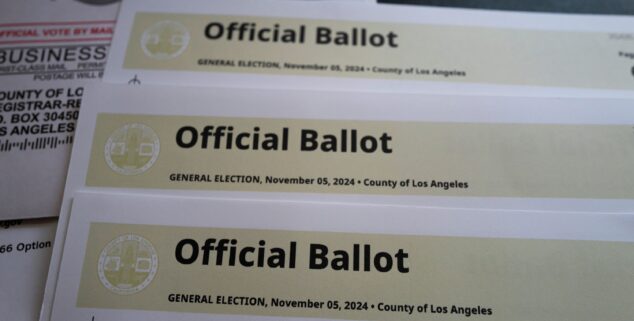Micheli Files
Ballot titles and arguments
 Image by AP
Image by APIn this week’s edition of the Micheli Files we examine the rules ballot titles and arguments.
Ballot Titles
California’s Elections Code provides rules for ballot titles that are used for measures submitted to the voters. These rules are found in Division 9, Chapter 1, Article 5. Section 9050 requires that, after the Secretary of State determines that a measure will appear on the ballot at the next statewide election, the Secretary of State must promptly transmit a copy of the measure to the Attorney General.
 The Attorney General is required to provide and return to the Secretary of State a ballot title and summary and ballot label for each measure submitted to the voters of the whole state by a date sufficient to meet the state voter information guide public display deadlines.
The Attorney General is required to provide and return to the Secretary of State a ballot title and summary and ballot label for each measure submitted to the voters of the whole state by a date sufficient to meet the state voter information guide public display deadlines.
Section 9051 provides that the ballot title and summary may differ from the legislative, circulating, or other title and summary of the measure, but cannot exceed 100 words, not including the fiscal impact statement. The ballot title and summary must include a summary of the Legislative Analyst’s estimate of the net state and local government fiscal impact prepared.
The ballot label cannot contain more than 75 words and must be a condensed version of the ballot title and summary including the financial impact summary prepared.
In providing the ballot title and summary, the Attorney General is required to give a true and impartial statement of the purpose of the measure in such language that the ballot title and summary is neither an argument, nor likely to create prejudice, for or against the proposed measure. The Attorney General is required to invite and consider public comment in preparing each ballot title and summary.
Section 9053 requires each measure to be designated on the ballot by the ballot label certified to the Secretary of State by the Attorney General.
Section 9054 specifies that, whenever a city, county, or city and county is required the federal Voting Rights Act of 1965 to provide a translation of ballot materials in a language other than English, the Secretary of State must provide a translation of the ballot title and summary and of the ballot label prepared in that language to the city, county, or city and county for each state measure submitted to the voters in a statewide election not later than 68 days before that election.
When preparing a translation in a language other than English, the Secretary of State must consult with an advisory body consisting of language experts and nonpartisan organizations that advocate on behalf of, or provide services to, individuals that speak that language. All translations prepared must be made available for public examination in the same time and manner as the state voter information guide is made available for public examination.
Ballot Arguments
California’s Elections Code provides rules for ballot arguments for measures submitted to the voters in state elections that are contained in Division 9, Chapter 1, Article 6. Article 6 is titled “Arguments Concerning Measures Submitted to Voters.” Section 9060 provides that, in case either the argument for or the argument against any measure placed on the ballot is not prepared and filed, the Secretary of State is required, by a general press release, to request voters to submit arguments.
Section 9061 requires the press release to be mailed at least 120 days prior to the date of the election at which a measure is to be voted upon. Section 9062 requires the press release to consist of an announcement containing:
- A summary of the essential nature or purpose of the measure for or against which no argument has been prepared or filed.
- A statement that the affirmative or negative arguments, or both, have not been filed.
- An invitation to any voter or group of voters to submit and file with the Secretary of State, within the time limit, arguments for or against the measure as to which affirmative or negative arguments have not been filed.
Section 9063 requires the summary of a measure given in the press release to be the official circulating title and summary that has been prepared by the Attorney General. Section 9064 provides that any voter or group of voters may, at any time within the time limit, prepare and file with the Secretary of State an argument for or against any measure as to which arguments have not been prepared or filed. This argument cannot exceed 500 words in length.
Section 9065 prohibits a ballot argument from being accepted unless accompanied by all of the following:
- The name, business or home address, and telephone number of each person submitting the argument.
- If the argument is submitted on behalf of an organization, the name, business address, and telephone number of the organization and of at least two of its principal officers.
- The name, business or home address, and telephone number of a contact person for each individual or organization submitting the argument.
- If the argument is signed by anyone other than the proponent or legislative author, the name and official title of the person or persons authorized by the proponent to sign the argument.
- The signed statement required.
- No person signing an argument for or against a measure or a rebuttal to an argument for or against a measure may identify himself or herself in reference to that signature as a candidate for any office.
Section 9067 provides that, if more than one argument for, or more than one argument against, a measure is filed within the time prescribed, the Secretary of State is required to select one of the arguments for printing in the state voter information guide. In selecting the argument, the Secretary of State must give preference and priority in the order named to the arguments of the following:
- In the case of a measure submitted by the Legislature, Members of the Legislature.
- In the case of an initiative or referendum measure, the proponent of the measure.
- Bona fide associations of citizens. There are specified rules with which the bona fide association must comply.
- Individual voters.
Section 9068 prohibits more than three signatures from appearing with an argument printed in the state voter information guide. In case an argument is signed by more than three persons, the signatures of the first three are printed.
Section 9069 provides that, when the Secretary of State has received the arguments that will be printed in the state voter information guide, the Secretary of State, within five days of receipt of the arguments, must send copies of the arguments in favor of the proposition to the authors of the arguments against and copies of the arguments against to the authors of the arguments in favor.
Thereafter, the authors may prepare and submit rebuttal arguments not exceeding 250 words, or may authorize in writing another person or persons to prepare, submit, or sign the rebuttal argument. The rebuttal arguments must be filed with the Secretary of State no later than a date to be designated by the Secretary of State.
In addition, rebuttal arguments are to be printed in the same manner as the direct arguments, and each rebuttal argument immediately follows the direct argument that it seeks to rebut.
Want to see more stories like this? Sign up for The Roundup, the free daily newsletter about California politics from the editors of Capitol Weekly. Stay up to date on the news you need to know.
Sign up below, then look for a confirmation email in your inbox.

Leave a Reply